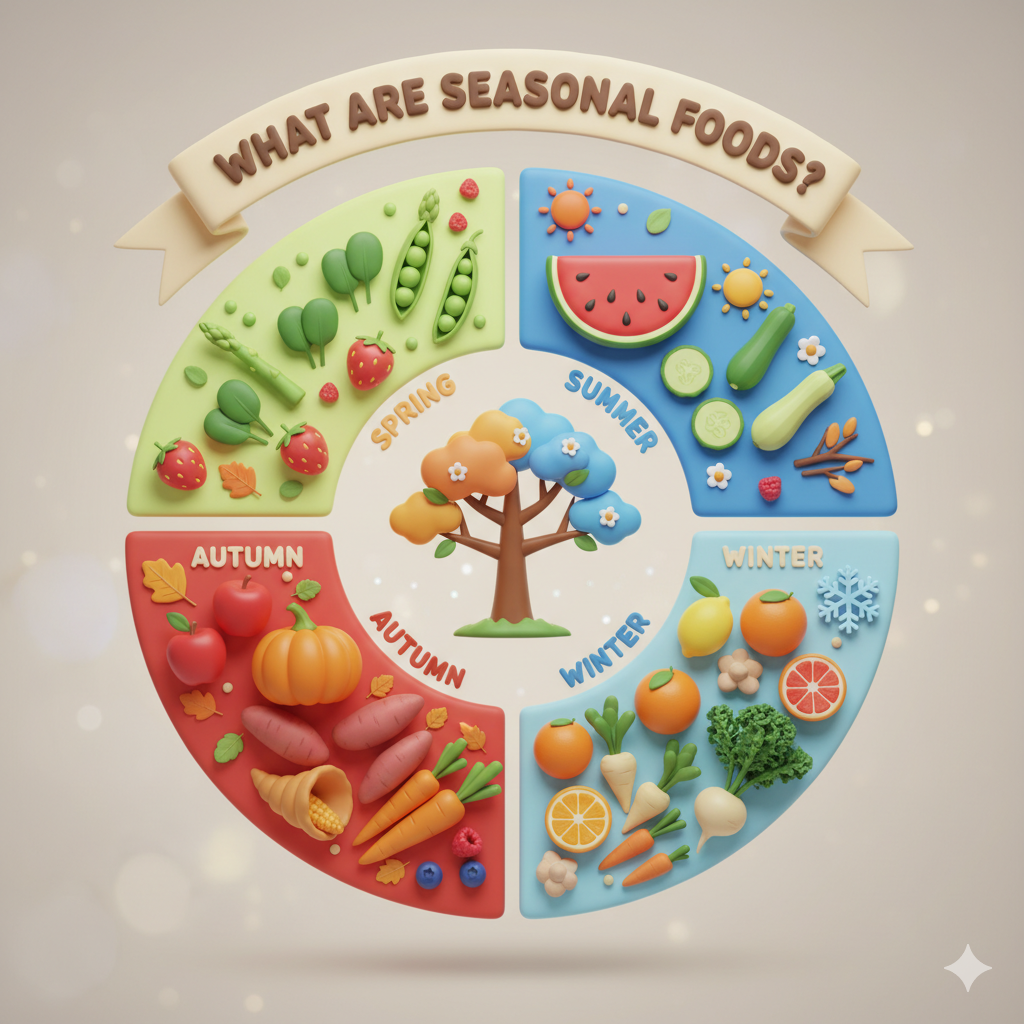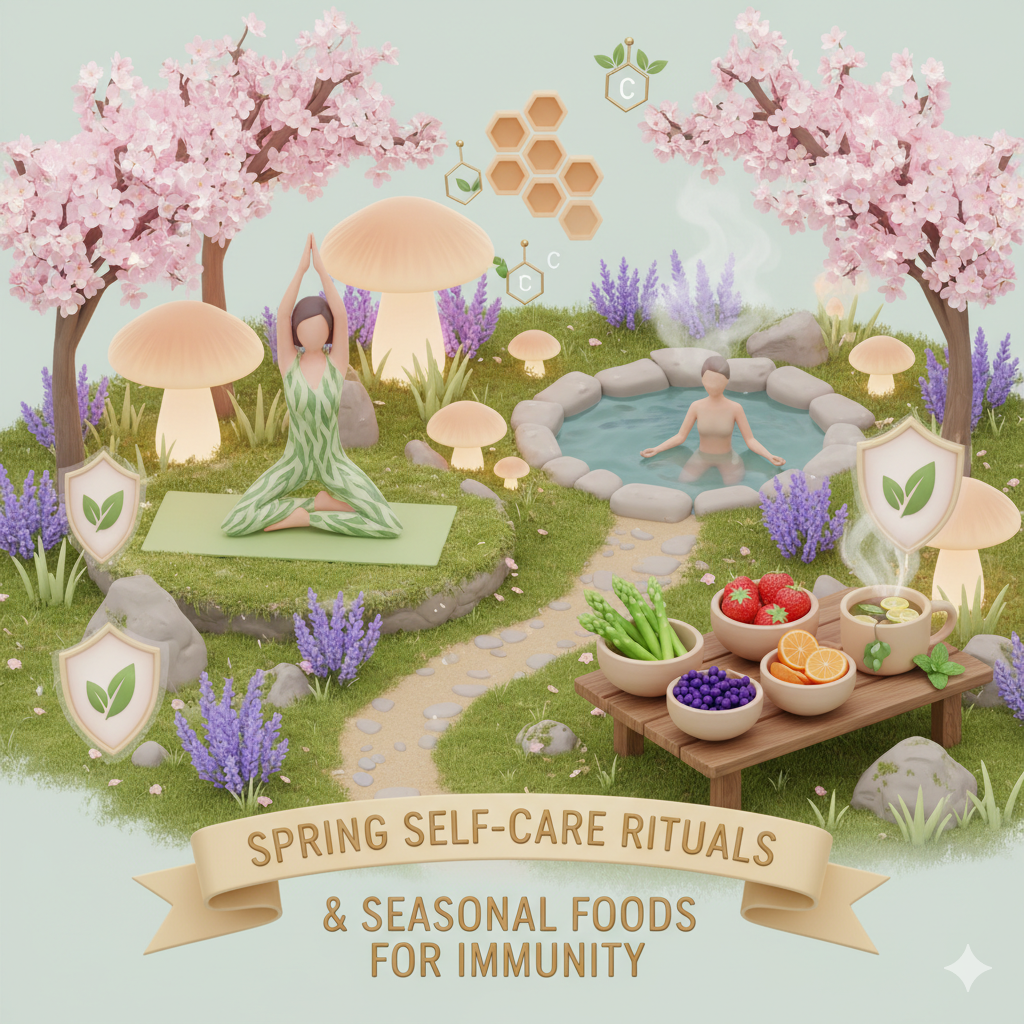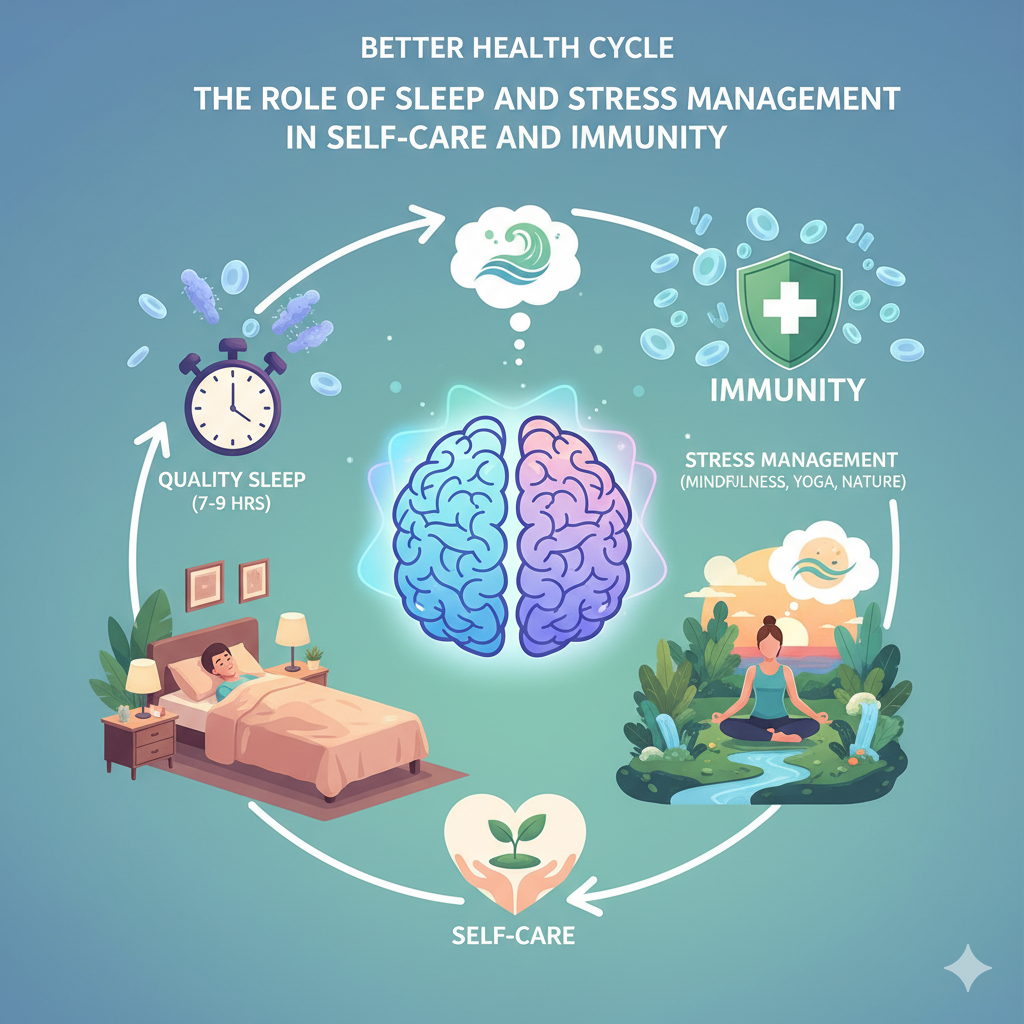The Connection Between Self-Care, Seasonal Foods, and Immunity

When was the last time you truly paused and asked yourself, “Am I taking care of my body the way it deserves?” In today’s fast-paced world, self-care isn’t just a luxury—it’s a necessity. Your immune system is your body’s natural defense mechanism, and it relies heavily on how well you treat yourself, both physically and mentally. Combining mindful self-care rituals with seasonal, nutrient-rich foods creates a holistic approach that keeps you resilient throughout the year.
Each season offers unique foods packed with specific vitamins, minerals, and antioxidants tailored by nature to support your body’s needs. Pairing these foods with personalized self-care practices—like mindful breathing, adequate rest, and regular consultation with a healthcare professional—can create a powerful immune shield.
This comprehensive guide explores step-by-step self-care rituals and seasonal foods that nourish your immune system. Plus, we’ll touch on the importance of consulting with doctors—especially through free consultations—to make sure your self-care journey aligns perfectly with your individual health goals.
Why Self-Care Matters for Immune System Health

Self-care isn’t just a buzzword—it’s a survival skill. When you care for your body and mind, your immune system gets the message that it’s safe to focus on protection and healing rather than survival. Imagine your immune system as a team of dedicated workers. If they’re overworked and undernourished, they can’t perform well. But if you feed them right, give them rest, and reduce their stress, they thrive—and so do you.
Physical Self-Care and Its Impact on Immunity

Physical self-care includes everything you do to nourish your body—eating well, staying active, and getting enough rest. Your immune system depends on a balanced diet rich in vitamins, minerals, and antioxidants. Seasonal fruits and vegetables, in particular, are loaded with the nutrients your body needs most at specific times of the year. For instance, citrus fruits in winter help replenish vitamin C when colds and flu are rampant, while leafy greens in spring aid detoxification.
Exercise also plays a crucial role. Even simple activities like walking or stretching help regulate circulation, ensuring immune cells move efficiently throughout your body. Meanwhile, sufficient sleep allows your body to repair tissues and produce protective cytokines—proteins that fight infection.
Mental and Emotional Self-Care Benefits



Your emotional health is directly linked to your immune response. Chronic stress releases cortisol, a hormone that suppresses immune activity. Self-care rituals like meditation, journaling, or spending time in nature can reduce stress and keep your immune system balanced.
Remember, self-care doesn’t have to be complicated. Sometimes, it’s as simple as making yourself a warm cup of herbal tea, breathing deeply, or turning off your phone an hour before bed. By building small rituals into your daily routine, you create a foundation of well-being that supports every system in your body—including your immune defense.
Understanding the Power of Seasonal Eating

Nature is remarkably wise. Every season brings foods that naturally help the body adapt to its environmental challenges. Eating seasonally means consuming fruits, vegetables, and herbs that are naturally harvested during a particular time of year. This approach not only supports local agriculture but also provides your body with the exact nutrients it needs for that season.
What Are Seasonal Foods?

Seasonal foods are those that grow and ripen naturally during a specific period. For instance:
- Spring: Spinach, asparagus, peas, strawberries.
- Summer: Watermelon, cucumbers, zucchini, berries.
- Autumn: Apples, pumpkins, sweet potatoes, carrots.
- Winter: Oranges, kale, citrus fruits, root vegetables.
When you eat seasonal produce, you consume foods at their nutritional peak. These fresh foods are rich in vitamins, minerals, and phytonutrients—plant compounds that strengthen your immune system.
Why Eating Seasonally Strengthens the Immune System
Your immune system thrives on balance. Seasonal foods provide that balance by giving your body what it needs most at specific times:
- Spring foods help cleanse and detoxify the body after winter.
- Summer foods keep you hydrated and cool.
- Autumn foods build strength and prepare the body for colder weather.
- Winter foods provide warmth and nourishment to fight off infections.
By eating in harmony with the seasons, you naturally support your immune health. It’s like syncing your body’s rhythm with nature’s clock—creating a stronger, more resilient system from within.
Spring Self-Care Rituals and Seasonal Foods for Immunity

Spring is the season of renewal—a time when nature awakens, flowers bloom, and your body craves light, fresh foods. It’s the perfect time to shed the heaviness of winter and reset your health routine. During spring, your immune system benefits from foods that cleanse, detoxify, and rejuvenate your body. Think of it as a natural reboot, preparing you for the active months ahead.
Detoxifying Foods for Spring Immunity Boost

In spring, your liver—the body’s main detox organ—plays a key role in maintaining immune strength. To support it, focus on foods that help eliminate toxins and promote energy flow. Some of the best spring foods include:
- Leafy greens such as spinach, kale, and arugula—rich in chlorophyll, they help cleanse the bloodstream.
- Asparagus—packed with antioxidants and fiber, it promotes digestive health.
- Citrus fruits—loaded with vitamin C, they enhance white blood cell production.
- Beets and radishes—great for liver support and detoxification.
- Artichokes—help improve liver function and support immunity.
Pair these foods with hydrating drinks like cucumber-infused water or green smoothies to flush out toxins.
Mindful Self-Care Practices for Renewal
Spring self-care is about lightness and new beginnings. Start by decluttering your living space—an organized home can help clear mental fog. Incorporate light exercise such as yoga, brisk walking, or tai chi to awaken your energy and boost lymphatic flow.
Another powerful ritual is morning sunlight exposure. Spending 15 minutes outdoors each morning helps regulate your circadian rhythm and boosts vitamin D levels—essential for immune system function.
You can also practice mindfulness by setting aside 10 minutes daily for breathing exercises or journaling. Reflecting on your goals during spring can align your mind with your body’s renewal process.
Together, these food and self-care rituals help you transition from the sluggishness of winter to the vibrancy of spring—ready to take on the year with a strengthened immune system.
Summer Self-Care Rituals and Immune-Boosting Foods

When summer arrives, your body’s main challenge shifts from keeping warm to staying cool and hydrated. The immune system can easily get stressed during heat waves or dehydration, so your self-care rituals and diet must adapt. Summer self-care revolves around hydration, cooling foods, and relaxation.
Hydration Habits and Cooling Foods

Summer foods are naturally hydrating, packed with water, vitamins, and electrolytes. Here’s what your plate should include:
- Watermelon and cucumbers—loaded with water and antioxidants, they keep your body hydrated.
- Berries—rich in vitamin C and anthocyanins that support immune health.
- Tomatoes—contain lycopene, a powerful antioxidant that protects cells.
- Mint and basil—cooling herbs that aid digestion and relieve heat stress.
- Coconut water—a natural electrolyte drink that replenishes lost minerals.
Avoid overly processed or fried foods that can cause inflammation or sluggishness. Instead, focus on fresh salads, cold soups, and fruit smoothies.
Self-Care Activities to Protect Against Heat Fatigue
In summer, your body craves relaxation and balance. Try incorporating these rituals:
- Hydrating self-care: Drink herbal teas like hibiscus or mint throughout the day.
- Cool showers: They help regulate body temperature and improve circulation.
- Evening walks: The best time to unwind while avoiding midday heat.
- Digital detox: Reduce screen time to rest your eyes and nervous system.
- Restorative naps: Short naps of 15–20 minutes can refresh your body without affecting nighttime sleep.
Practicing gratitude journaling in summer can also boost emotional well-being, reducing stress—a major immunity drainer.
By staying hydrated, eating fresh, and embracing relaxation, your body remains strong and your immune defenses stay alert, even under the summer sun.
Autumn Self-Care Rituals to Strengthen Your Immune System
Autumn marks the transition from warmth to cooler, shorter days. It’s a season of change—and for your immune system, that means preparing for the challenges of cold and flu season. The crisp air and falling leaves remind us to slow down, nourish deeply, and restore balance before winter arrives.
Warming Foods to Prepare for Cold Season


As temperatures drop, your body needs more warming and grounding foods to maintain energy and strengthen immunity. Here’s what to focus on:
- Pumpkins and sweet potatoes – These are rich in beta-carotene, which the body converts into vitamin A, essential for immune defense and healthy skin.
- Apples and pears – Fiber-packed fruits that support gut health, which in turn regulates immune responses.
- Garlic and onions – Natural antibiotics that help combat seasonal infections.
- Mushrooms (especially shiitake and maitake) – Known for boosting white blood cell activity.
- Root vegetables like carrots, parsnips, and beets – These provide energy and grounding nutrients.
Try incorporating these into hearty soups, stews, or roasted dishes. Pair them with immune-boosting herbs such as turmeric and ginger to increase warmth and fight inflammation.
Mental Self-Care for Seasonal Transitions
Autumn can sometimes trigger feelings of melancholy or fatigue due to shorter daylight hours. To maintain emotional balance, prioritize mental and emotional self-care.
Start with gratitude rituals—reflect each evening on three things you’re thankful for. This simple practice increases positivity and reduces stress hormones. Engage in creative hobbies like painting, cooking, or journaling to channel your thoughts productively.
Additionally, getting outside and enjoying the crisp fall air is essential. Exposure to natural light helps regulate serotonin levels, which affect mood and immunity. Try nature walks among autumn leaves—it’s a gentle way to stay active and mindful.
Autumn’s message is clear: slow down, nourish deeply, and fortify your body for the colder months. By syncing your self-care with the season’s rhythm, your immune system will stay resilient and ready for winter.
Winter Self-Care Rituals with Immunity-Enhancing Foods

Winter is often seen as a time for rest and reflection. However, it’s also when your immune system works hardest. Cold weather, reduced sunlight, and indoor living can lower immunity. This is when self-care rituals and nourishing foods become essential for your overall well-being.
Comfort Foods That Heal and Protect
Winter calls for foods that warm your body and support internal defense mechanisms. Focus on:
- Citrus fruits (oranges, grapefruits, lemons) – High in vitamin C to ward off infections.
- Dark leafy greens (kale, collard greens, spinach) – Provide iron, calcium, and antioxidants.
- Whole grains (oats, quinoa, barley) – Support steady energy and digestion.
- Ginger and turmeric – Anti-inflammatory spices that improve circulation and strengthen immunity.
- Bone broth or lentil soups – Packed with minerals, collagen, and protein for cellular repair.
A nourishing winter diet not only keeps you warm but also replenishes your body’s nutrient reserves. Herbal teas like chamomile, echinacea, and elderberry are especially effective in supporting respiratory health.
Self-Care Practices to Beat Winter Blues
Winter can sometimes feel isolating, leading to “winter blues” or even seasonal affective disorder (SAD). Incorporating gentle but powerful self-care rituals helps maintain mental and emotional stability.
- Daily light exposure: Step outside during daylight hours, even for 10 minutes.
- Warm baths with essential oils: Relaxing scents like lavender or eucalyptus ease tension.
- Meditation or gratitude journaling: Keeps your thoughts positive and grounded.
- Indoor movement: Practice yoga or stretching to keep blood flowing.
- Early bedtime rituals: Prioritize sleep—your body repairs and regenerates most during rest.
Winter is about restoration. By listening to your body’s need for warmth, nourishment, and stillness, you strengthen not just your immune system, but your entire sense of well-being.
Superfoods to Strengthen Your Immune System Year-Round

No matter the season, certain nutrient-dense “superfoods” serve as your immune system’s best allies. They’re rich in antioxidants, vitamins, and minerals that protect your cells from damage, fight inflammation, and promote overall vitality. By incorporating these foods into your daily meals, you can keep your immunity robust all year long.
Top Fruits and Vegetables for Immunity
- Citrus Fruits (Oranges, Lemons, Grapefruits)
These are perhaps the most famous immunity boosters. Citrus fruits are high in vitamin C, which stimulates the production of white blood cells—the body’s primary defense against infection. They’re also hydrating and refreshing, helping to flush out toxins. - Berries (Blueberries, Strawberries, Raspberries)
Tiny but mighty, berries are loaded with antioxidants like anthocyanins that combat oxidative stress and inflammation. A daily handful in your smoothie, oatmeal, or yogurt can significantly enhance immune resilience. - Leafy Greens (Spinach, Kale, Swiss Chard)
These greens are a powerhouse of vitamins A, C, and K, as well as folate and iron. They not only help build strong cells but also support detoxification. Lightly steaming or sautéing them improves nutrient absorption. - Broccoli and Cauliflower
Packed with vitamins C and E, fiber, and phytonutrients, cruciferous vegetables support liver function and detox processes essential for immune balance. - Carrots and Sweet Potatoes
Their vibrant orange color is due to beta-carotene, a nutrient that strengthens mucous membranes—the body’s first line of defense against germs.
Herbs and Spices with Immune-Boosting Properties
- Garlic: Contains allicin, a compound with potent antibacterial and antiviral effects. Adding fresh garlic to meals can prevent seasonal colds.
- Turmeric: The active compound curcumin has anti-inflammatory benefits that strengthen immune response.
- Ginger: Helps clear congestion, reduce inflammation, and soothe the digestive system.
- Cinnamon: A warming spice that regulates blood sugar and provides antioxidants.
- Oregano: Contains natural antimicrobial agents that fight infections.
These superfoods and herbs can easily be added to soups, teas, smoothies, or salads. Over time, they work together like an internal armor, keeping your immune system alert and your body energized.
Holistic Self-Care Practices to Support Immune Health

True immunity doesn’t come from diet alone—it’s a balance of physical, emotional, and spiritual well-being. Holistic self-care helps align all aspects of health, allowing your body to function optimally.
Meditation and Mindfulness
Meditation isn’t just about quieting your mind—it’s about creating harmony within. Studies show that mindfulness reduces cortisol levels and improves immune function by enhancing cellular repair. You can start small: just 10 minutes of deep breathing or guided meditation daily.
Mindfulness also encourages gratitude and awareness, helping you make better lifestyle and food choices. Being present during meals, for instance, helps digestion and nutrient absorption, which are key for immunity.
Yoga and Gentle Exercise
Movement is medicine. Regular physical activity increases circulation, allowing immune cells to move freely and detect potential threats early. Yoga, in particular, combines movement, breath, and mindfulness, reducing stress while strengthening muscles and respiratory health.
Gentle exercises like walking, stretching, or swimming are equally beneficial. The goal is consistency, not intensity. Even 20 minutes of movement daily can make a significant difference in how your immune system functions.
By combining mindfulness with regular movement, you create a self-care practice that supports not just physical health, but emotional balance and mental clarity too.
The Role of Sleep and Stress Management in Self-Care and Immunity

Sleep and stress are two of the most overlooked aspects of immune health. Your body regenerates while you sleep, repairing tissues and producing infection-fighting proteins. When stress or poor sleep becomes chronic, your immunity weakens, leaving you vulnerable.
How Sleep Quality Affects Immune Function
During deep sleep, your immune system releases cytokines—proteins that help combat infection and inflammation. Missing out on rest reduces cytokine production, making it harder for your body to recover from illness.
To improve sleep quality:
- Maintain a regular bedtime routine.
- Avoid caffeine and screens at least two hours before sleep.
- Create a peaceful environment with dim lighting and calm music.
- Try herbal teas like chamomile or valerian root to promote relaxation.
Stress-Relief Rituals to Keep Your Immune System Strong
Chronic stress floods the body with cortisol, suppressing immune function. Managing stress effectively is a cornerstone of self-care.
Simple yet powerful rituals include:
- Deep breathing exercises to calm the nervous system.
- Journaling to release pent-up emotions.
- Nature walks to reconnect with calm surroundings.
- Laughter therapy—watch something funny or talk to loved ones.
Reducing stress doesn’t just make you feel better—it literally recharges your immune system, preparing it to defend you more efficiently.
The Importance of Gut Health in Building Immunity

Did you know that nearly 70% of your immune system resides in your gut? That’s right—your digestive system does far more than process food. It acts as your body’s internal defense line, regulating inflammation, fighting pathogens, and producing essential immune cells. A healthy gut equals a strong immune system, and your self-care rituals should absolutely include nurturing it.
Probiotic and Prebiotic Foods
Your gut hosts billions of microorganisms—collectively known as the gut microbiome. The balance of these bacteria determines how effectively your immune system functions. This is where probiotics and prebiotics come into play:
- Probiotic Foods: These contain live beneficial bacteria that restore gut balance. Examples include yogurt, kefir, sauerkraut, kimchi, and miso. Regular intake of these helps reduce inflammation and boost resistance to infections.
- Prebiotic Foods: These are fibers that feed the good bacteria in your gut. Foods like garlic, onions, leeks, asparagus, and bananas nourish your microbiome and improve digestion.
Including both probiotics and prebiotics in your diet creates a healthy ecosystem in your gut, ensuring a strong foundation for immunity.
Gut-Friendly Self-Care Rituals
Beyond diet, self-care practices can help maintain gut health too. Chronic stress, lack of sleep, and processed foods can disrupt your microbiome balance. Try these rituals:
- Eat slowly and mindfully, giving your body time to digest properly.
- Stay hydrated throughout the day to support nutrient absorption.
- Incorporate fermented foods regularly.
- Limit sugar, refined carbs, and alcohol.
- Manage stress through yoga, meditation, or simply spending time in nature.
A healthy gut acts like fertile soil—when it’s nourished, everything that grows from it (including your immune defenses) thrives.
Hydration Rituals for a Strong Immune System
Water is life—quite literally. Proper hydration supports every bodily function, including digestion, detoxification, and circulation. When you’re dehydrated, toxins accumulate, energy drops, and your immune system weakens. Hydration isn’t just about drinking water; it’s about creating rituals that remind you to stay consistent.
Herbal Teas and Detox Water Recipes
To make hydration more enjoyable, infuse your water with natural flavors and nutrients. Here are some immune-supporting ideas:
- Lemon and Ginger Water: Helps flush toxins and boost vitamin C intake.
- Cucumber and Mint Water: Refreshing and cooling for summer hydration.
- Turmeric and Black Pepper Tea: A warm, anti-inflammatory drink that enhances immunity.
- Green Tea with Honey: Packed with antioxidants that fight free radicals.
- Hibiscus Tea: High in vitamin C and great for heart and immune health.
Herbal teas also provide warmth and comfort, especially during cooler seasons.
Daily Water-Tracking Self-Care Tips
To stay hydrated consistently, try these tips:
- Start your morning with a glass of warm water and lemon.
- Keep a reusable bottle nearby as a reminder.
- Set phone reminders every two hours to sip water.
- Add fruits or herbs to your bottle for variety.
- Consume hydrating foods like watermelon, oranges, and cucumbers.
Hydration is one of the simplest yet most powerful self-care habits you can adopt. When your body is hydrated, nutrients move efficiently, your cells regenerate better, and your immune system remains alert and strong.
Integrating Free Doctor Consultation into Your Self-Care Routine

Incorporating professional guidance into your self-care plan ensures that your efforts are safe, effective, and tailored to your individual health needs. A free doctor consultation can be an excellent way to get personalized advice without financial strain.
Benefits of Professional Guidance for Immunity
Doctors can help identify nutritional deficiencies, allergies, or health risks that might be affecting your immune system. They can also recommend specific seasonal foods or supplements to enhance your diet. For example, if your vitamin D levels are low, a doctor can suggest proper dosage and safe sun exposure practices.
Moreover, consulting with a medical professional helps you monitor long-term progress. They can provide insights on how your self-care rituals impact your overall wellness—helping you make adjustments when needed.
How to Prepare for an Online or Free Doctor Consultation
Before your consultation, keep a wellness journal noting your daily meals, sleep patterns, stress levels, and any symptoms. This helps your doctor understand your lifestyle and make practical recommendations.
During the consultation:
- Ask about immune-boosting nutrients and foods.
- Discuss how seasonal changes might affect your health.
- Seek advice on safe detox methods and supplement use.
- Request guidance on sustainable self-care practices for long-term wellness.
Free consultations make expert advice more accessible and empower you to make informed health choices. Pairing self-care with professional insight ensures your immune-strengthening journey is both balanced and effective.
Personalizing Your Self-Care and Nutrition Plan

Every person’s body is unique—what strengthens one person’s immune system may not work exactly the same for another. That’s why personalizing your self-care and nutrition plan is essential. A truly effective routine considers your body type, lifestyle, environment, and even emotional health. The goal is to design a plan that feels natural, sustainable, and empowering.
Tracking Your Seasonal Eating Habits
To personalize your nutrition, start by tracking what you eat and how it makes you feel. Keep a simple food journal and note your energy levels, digestion, and mood after meals. Over time, patterns will appear—you’ll discover which foods boost your energy and which ones leave you sluggish.
For example, you might notice that:
- Spring greens make you feel lighter and more energized.
- Summer fruits keep you hydrated and glowing.
- Autumn soups bring warmth and comfort.
- Winter stews make you feel nourished and grounded.
This awareness helps you align your meals with your body’s natural rhythm and the changing seasons. You’re not just eating for hunger—you’re eating with intention, which is the foundation of mindful self-care.
Adjusting Rituals for Your Unique Health Needs
Everyone’s immune system reacts differently to stress, environment, and nutrition. That’s why flexibility in your self-care plan is vital. Listen to your body—if you’re constantly fatigued, it might need more rest. If your digestion feels off, your gut might need more probiotics.
Consider these adjustments:
- Increase antioxidant-rich foods if you live in a polluted or stressful area.
- Add more vitamin D and warm foods during winter months or if you get less sunlight.
- Include hydrating foods and lighter meals in hot weather.
- Focus on iron-rich foods if you experience low energy or frequent illness.
Also, remember that emotional health influences immunity. Include self-care rituals like journaling, gratitude reflection, or even aromatherapy to maintain a calm, centered mindset.
By continuously fine-tuning your rituals, you create a self-care plan that’s not just effective—it becomes a personalized act of love for your body.
Creating a Sustainable Self-Care Routine for Long-Term Immunity
Building a strong immune system isn’t about quick fixes—it’s about developing habits that become second nature. Sustainability is the secret ingredient to lasting wellness. A consistent self-care routine allows your immune system to perform at its peak, even during stressful or transitional times.
Setting Realistic Health Goals
Start small. Instead of trying to overhaul your entire lifestyle, introduce one or two healthy habits at a time. For instance, commit to drinking eight glasses of water daily or adding one seasonal fruit to your breakfast. Small, consistent changes have a compound effect on your health.
Define your goals clearly:
- Eat more seasonal and whole foods.
- Sleep at least 7–8 hours nightly.
- Practice mindfulness or light exercise daily.
- Schedule a monthly check-in or consultation with a doctor.
Celebrate every small milestone. Over time, these habits will feel natural, and your immune system will thank you.
Building Consistency in Self-Care Practices
Consistency is what turns self-care from a routine into a lifestyle. Here are practical tips to stay on track:
- Create a daily self-care checklist.
- Set reminders for hydration, meals, and rest.
- Prepare weekly grocery lists based on seasonal produce.
- Keep motivational notes around your living space.
- Involve family or friends in your wellness journey.
Remember: self-care isn’t selfish—it’s survival. When you prioritize yourself, your energy, mood, and immune system all improve, allowing you to show up stronger for everything else in life.
A sustainable self-care routine doesn’t mean perfection—it’s about balance. Some days you’ll rest more; other days you’ll be active. The key is to listen to your body and honor its needs with compassion and consistency.
Embrace Seasonal Self-Care for a Lifetime of Wellness
Your body is designed to heal, protect, and thrive—but only if you give it the right tools. Embracing self-care rituals and seasonal foods isn’t just about staying healthy today; it’s about creating a lifelong partnership with your body. Each season brings new opportunities to nourish, reset, and grow stronger.
By syncing your habits with nature’s cycles—eating seasonal produce, staying hydrated, managing stress, and prioritizing rest—you build immunity from the inside out. Add to that the power of mindful living and professional guidance through free doctor consultations, and you have a holistic plan for vibrant health.
Remember, self-care isn’t a one-time event—it’s an ongoing conversation with yourself. Every nourishing meal, every mindful breath, every restful night adds up to a stronger, happier, and healthier you.
So, as you move through each season, let your self-care be your compass. Eat mindfully, live intentionally, and let your immune system flourish naturally.
FAQs About Self-Care Rituals and Seasonal Foods for Immunity
- What are the best seasonal foods for boosting immunity?
Citrus fruits, leafy greens, berries, garlic, ginger, and root vegetables are among the best seasonal foods to strengthen your immune system. Eating them fresh and in season ensures maximum nutrient absorption. - How does self-care affect immune health?
Self-care reduces stress, improves sleep, and supports healthy digestion—all of which directly boost immune function. It also helps maintain emotional balance, which is vital for overall wellness. - How often should I consult a doctor about my immune health?
A free doctor consultation every few months can help monitor your progress, address nutritional deficiencies, and ensure your self-care plan aligns with your specific health needs. - Can meditation and yoga really improve immunity?
Yes! Mind-body practices like yoga and meditation lower stress hormones, improve circulation, and promote balance in the nervous system—all of which enhance immune strength. - How can I stay consistent with self-care during busy days?
Plan ahead. Prepare meals in advance, set reminders for hydration and movement, and dedicate just 10–15 minutes daily for mindfulness or stretching. Small steps lead to lasting results.


Leave a Reply